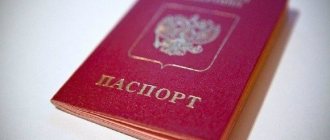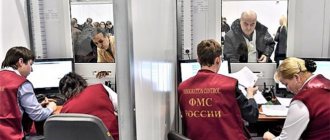Citizens planning to move to the capital of the Russian Federation usually wonder how long they can stay in Moscow without registration. In addition, they are interested in the specifics of registration, as well as the consequences of its absence. All these issues will be discussed further. The information presented is relevant not only for Moscow, but also for other regions of Russia.
Initial registration
Is it possible to stay in Moscow without registration? Yes, as in any other region of the Russian Federation. Applying for registration takes some time, and so does finding suitable housing. But this does not mean that a citizen can postpone registration actions for a long time.
Primary registration (registration of newborns) has no restrictions. You can register your child at any time. But it is better to cope with this task during the first month of the baby’s life. Otherwise, serious difficulties will arise with the preparation of children's documents and benefits.
Temporary registration
How long can you stay in Moscow without registration? A person who came to Russia or changed his place of residence has the right not to register for migration for three months.
This means that you don’t have to think about registration actions for 90 days. But it's better to hurry up. If you fail to complete your registration in time, you will have to face serious consequences. This is especially true for foreign citizens.
Important: after 3 months, a person must obtain either temporary or permanent registration in the region where he is located.
What if you miss deadlines?
Despite the document establishing the citizen’s right to freedom of movement, the state will punish you with a fine for not having a stamp. Article 19.15.1 of the Code of Administrative Violations provides for such a violation. According to this document, a citizen is required to register within seven days.
Code of Administrative Offenses of the Russian Federation, Article 19.15. Residence of a citizen of the Russian Federation without an identification document (passport)
- Residence at the place of stay or at the place of residence in the residential premises of a citizen of the Russian Federation who is required to have an identification document of a citizen (passport), without an identification document of a citizen (passport), or with an invalid identification document of a citizen (passport) - entails imposition of an administrative fine in the amount of two thousand to three thousand rubles.
- The violation provided for in Part 1 of this article, committed in the federal city of Moscow or St. Petersburg, entails the imposition of an administrative fine in the amount of three thousand to five thousand rubles.
For missing a deadline, the code provides for penalties in the amount of one and a half to three thousand rubles, and for Moscow and St. Petersburg from 5 to 7 tons.
This rule applies to both permanent and temporary registration.
That is, even if there is a stamp in your passport, and you will be temporarily in another place, you must issue a temporary registration.
Facts of lack of registration can be identified by an official (when checking documents) or the Federal Migration Service when submitting documents for registration.
You have the right to reside at any address that is not your permanent place of residence for up to 90 days. If you live in a rented apartment, you must obtain temporary registration in it no later than within 3 months.
The fine for its absence will be paid by the owner of the property in which you live.
For owners whose living space is occupied by citizens without registration, a fine of 3 to 5 thousand for regions, from 5 to 7 thousand for Moscow and St. Petersburg is also provided. Legal entities for such violations are subject to fines from 50 to 757 thousand (Article 19.15.1 Code of Administrative Offenses).
Re-registration
But that is not all. We found out how many days you can stay in Moscow without registration. Visiting people must obtain registration within three months. And it doesn’t matter what it will be - temporary or indefinite.
What to do with re-registration? How long can one stay in Moscow without registration if a person has been discharged from housing?
A citizen is given only a week to find a new place of residence or temporary stay. Within 7 days, the discharged person must find housing and also submit an application in the prescribed form for registration actions.
For children
In the case of minors, considerable problems arise with their re-registration. How long can you live without registration in Moscow?
In general, if we are talking about re-registration, then the child needs to find a new home within a week. In practice the situation is different.
The point is that minors cannot be discharged anywhere. This means that you will first have to find a new place of residence for the child, and then re-register. Accordingly, it is problematic to miss the deadlines set for searching for housing.
Nevertheless, in real life, discharge to nowhere is still practiced. And in this case, only a week is allotted for re-registration of the child.
What is the period for registration under a rental agreement?
As already noted, the period for registration under a rental agreement is determined by agreement of the parties.
Thus, the period for registering a person at the address where he rents housing is 7 days and is calculated:
- from the time of conclusion of the relevant agreement;
- from the moment indicated on the day the tenant moved into the property;
- from the moment when the parties actually transferred the housing.
There is also a rule according to which the 7-day period for registering a person begins to count from the time of actual occupancy in the relevant residential premises. However, this is only possible if there is a documentary substantiation of this fact.
When there is no such document, the moment from which the 7-day registration period under the lease agreement is calculated is the day the right to reside in the relevant residential premises arises, that is, the moment the agreement is concluded.
In addition, the issue of registering persons who will move into the appropriate housing together with the tenant can be decided separately. So, if they can prove the date of move-in with documents, then they must register within a week from the day specified in the document.
If it is impossible to document the date of move-in, then they are also required to register within a week from the moment the tenant enters into a rental agreement.
The parties to the agreement have the right to determine, in a separate condition, the date from which certain persons must be moved into the apartment or residential building.
Individuals can sell their homes and move to another home. A document that confirms the time of moving from a sold home after selling an apartment or moving to a place in another city is necessary to calculate the period during which persons must register. But this document, for example, a purchase and sale agreement, is not provided separately unless it is considered at the same time to confirm the basis for accounting.
At the same time, certification of the moment a person moves into a home is necessary for the following:
- to calculate the time during which persons need to obtain registration;
- to certify at the passport office that the registration time has been met;
- to prove the fact of a person’s guilt or innocence in violating the accounting time and bringing him to justice.
Thus, the presence of documentary evidence of the fact that a person has moved into the appropriate apartment can protect against an unnecessary administrative fine.
When changing your residential address, you do not need to throw away tickets and other travel documents that prove the fact of arrival at a particular accommodation.
As already noted, violation of the deadlines for registering a citizen of the Russian Federation at his residence address is considered an administrative violation. As with most offenses of this nature, a fine is imposed for delaying the time to send an application for registration to the passport office.
The fine for such an offense is 2–5 thousand rubles. In large cities, the amount of this fine is slightly larger and can range from 5 to 7 thousand rubles.
But the law provides for cases when persons are not held accountable for such offenses.
So:
- if a newborn lives in the house where his mother is registered, then the lack of registration or failure to comply with the registration time is not an offense;
- when the person who violated the registration deadlines is the closest relative of the owner of the property;
- if the person who violated the registration deadlines is a close relative of the tenant.
In all other cases, for example, when a newborn child lives without registration with his father, this is not permitted and is considered a violation, and the father is subject to a fine. After all, the law has a rule on initial registration, when a newborn is automatically considered registered at the address of his mother.
In addition, persons can be evicted from the living space they occupy if they do not have registration. But how can you remove a person without his consent when he has a registration? Judicial proceedings are provided as a method for deregistering such persons. In other cases, discharge is made voluntarily.
Each person is given the freedom to live anywhere in Russia and independently choose their region of residence. But, despite this, a citizen must still go through the registration procedure at his place of residence. The stamp is necessary so that a person can avoid difficulties when applying for a job, visiting a hospital, enrolling children in kindergarten or school, etc. In this article we will talk about how long you can live without registration, and what responsibility may follow for ignoring such a duty.
Before considering this issue, it is worth remembering that registration can be either temporary or permanent. Permanent registration is carried out at the address where the citizen permanently resides. Temporary registration is necessary if a person left his permanent place of residence and moved to another region for a certain period. For example, he moved for the duration of his studies, business trip, or treatment.
You should also not confuse registration and place of stay. The place of stay can be a sanatorium, a hotel, a medical institution, a campsite, a tourist center, etc., that is, a place where a person stays for certain reasons for a short period of time.
If we are talking about permanent registration, then it is necessary to put a stamp on the new address within 1 week from the moment of moving to a new home. A note about the new address is placed in the passport.
Therefore, it should be taken into account that after the sale of a home, you need to move into a new one within 7 days
. However, this period is not calculated from the moment of registration at the old address, but from the moment of moving to a new place. The date of moving to a new place must be confirmed with travel tickets.
If for some time you do not have the opportunity to immediately register permanently, you can temporarily apply for temporary registration if, for example, you have not yet bought a home and plan to live with relatives for some time.
How long can you live without registration if we are talking about temporary registration? In this case, you can obtain the appropriate certificate within 90 days from the date of residence in the new place. But this rule applies only to Russians; foreigners are obliged to submit documents for registration no later than 7 days from the date of arrival in the Russian Federation.
Moreover, the application for registration at a specific address is submitted not by the migrant, but by the owner of the home where the guest will live. There are exceptions to this rule. Foreign citizens must register within 3 days if they arrive in the capital or St. Petersburg.
Where is the operation performed?
You can stay in Moscow without registration for the same amount of time as in any other city in Russia. How to register? Below you will find information to help you cope with this task.
You can register at your place of residence or stay either in your own home or in someone else’s. In the second case, you will have to obtain the consent of all owners of the house/apartment.
You can apply for registration at the migration service, the Federal Migration Service, the passport office or the multifunctional center. In this case, it is necessary to contact the authorized service at the person’s intended place of residence. How long can you stay in Moscow without registration? How to arrange it? The answers to these questions are much easier to find than it seems!
Important: through the ESIA, registration of temporary and permanent registration is available only to persons who have confirmed their accounts.
Is it possible to live without registration according to the Law?
Registration measures, although they have a warning function, are constantly being tightened and streamlined in order to simplify accounting procedures.
Legislative acts regulating registration issues are adjusted over time.
- Federal Law 5242-1 dated June 25, 1993 Art.5, Art.6. The law is called “On the right of citizens of the Russian Federation to freedom of movement...”, the last amendments to it were made on 06/02/2019. Article 5 regulates all aspects of registration and deregistration at the place of non-permanent residence of citizens. Article 6 specifies the norms and procedure for conducting, and the timing of, registration measures at the place of residence.
- Government Decree of July 17, 1995 No. 713. This Resolution approved the Rules for Registration of Citizens. The latest changes were made to this legislative act on December 23, 2016. The “Rules...” establishes which bodies have the rights to accept documents, what the composition of these papers is, within what time frame and how this or that action can be carried out at the place of residence or permanent location.
In passport
After contacting the Migration Service, the result of registration at the place of permanent residence is the presence of a corresponding mark in the citizen’s passport.
The stamp indicates:
- details of the FMS department of the locality that registered the citizen;
- registration address indicating street, house and apartment numbers;
- registration date.
Such a stamp can only be affixed when applying for permanent registration. The fact of temporary registration is confirmed by documentary evidence. It must be included in your ID and presented upon request. You may find yourself without registration in several cases, for example, after selling your home and when moving to another city.
Changing your residence address due to improvement, expansion of living space or other circumstances is a common occurrence. Therefore, when selling an apartment, you will need to register at this address and register in the new housing. This must be done within a week. The citizen checks out of the apartment before its immediate sale or stipulates a specific period in the transaction agreement.
Then, within 7 days, documents are submitted for registration at the address of the new home, if purchased. In case of temporary absence of this, you can temporarily register in living space with relatives or close friends.
After discharge
The starting date for the seven-day period allotted for registration should be the date of arrival at the new place of residence. But not the date of discharge from the previous address. After a citizen has acquired a new home, he must submit an application to the Federal Migration Service for registration within 7 days.
Availability of living space is confirmed:
- the right to establishing documents for a residential property (the period is counted from the date of conclusion of the transaction agreement);
- housing rental agreement;
- plane, train, bus passes when moving to another city.
In another city
Registration in another city can be temporary or permanent.
It is important to comply with deadlines, otherwise you may receive a fine:
- If a citizen registers on a permanent basis, then in addition to the application, a document giving the right to register and a passport, the specialist may require proof of the fact of stay, that is, he will need to present tickets and boarding passes.
- Temporary stay without registration in a foreign city is allowed for a period of no more than 90 days. Then you need to submit an application to the Federal Migration Service or MFC.
The term was replaced by the concept of “registration of citizens at the place of residence,” which was introduced for the purpose of notifying the FMS authorities about the movement of citizens within the country.
On the basis of this law, the constituent entities of the federation adopted their own Resolutions regulating the procedure for this procedure in a specific territory.
The law clearly distinguishes between the concepts of place of residence and place of temporary stay. The conduct and timing of each type of procedure are regulated by the “Rules for registration and deregistration of citizens of the Russian Federation” (Resolution No. 713 of July 17, 1995, as amended in 2010).
Permanent registration is registration in your own residential premises or municipal apartment provided under a social security agreement. hiring. Temporary registration – registration at a temporary place of residence. This could be rented housing, an apartment for relatives, friends, office premises, a dormitory, etc.
According to the law, permanent registration can only be obtained in your own home or in a municipal apartment provided under a social security agreement. hiring
If a citizen deregisters, he must register in the new place seven days in advance. These deadlines are established by Government Decree No. 809 of August 15, 2014.
In order to meet the deadline, it is more advisable for a citizen to apply for registration when he arrives at a new place and automatically register from the old address. Carrying out the procedure in this way will avoid missing the registration deadline at your new place of residence.
Missing a deadline is permitted for a valid reason:
- Buying a home.
- Illness with treatment in a hospital or at home.
- Business trip to another city.
Each case requires confirmation by documents (certificates from the hospital, travel certificate, certificate from work, purchase agreement for living space).
The regulations in force reflect the responsibilities that must be observed. The procedure for issuing a registration document confirming legal stay in the Russian Federation is regulated by the Federal Law and codes:
- GK;
- Code of Administrative Offences;
- LCD;
- Government Decree No. 713;
- Federal Law No. 5242-1.
Article 20 of the Civil Code defines the meaning of the concept of “place of residence” for adults and incapacitated individuals. In Art. 19.15.1 of the Code of Administrative Offenses of the Russian Federation reflects the type of punishment for the lack of documentary evidence of registration. Article 4 of the Housing Code defines the right to freely choose premises for living.
In Art. 4 of the RF PP No. 713 stipulates the mandatory presence of registration. The regulatory act reflects the procedure for obtaining registration at the place of residence and stay. Articles 5 and 6 of Federal Law No. 5242-1 reflect the period within which you need to register. The law lists the documents that must be presented for registration, and the specifics of registration in individual regions of the country.
- Federal Law 5242-1 dated June 25, 1993 Art.5, Art.6. The law is called “On the right of citizens of the Russian Federation to freedom of movement...”, the last amendments to it were made on June 2, 2016. Article 5 regulates all aspects of registration and deregistration at the place of non-permanent residence of citizens. Article 6 specifies the norms and procedure for conducting, and the timing of, registration measures at the place of residence.
- Government Decree of July 17, 1995 No. 713. This Resolution approved the Rules for Registration of Citizens. The latest changes were made to this legislative act on December 23, 2016. The “Rules...” establishes which bodies have the rights to accept documents, what the composition of these papers is, within what time frame and how this or that action can be carried out at the place of residence or permanent location.
We invite you to read: Bankruptcy of individuals in 2021
lenets_tan/Fotolia
Registration Rules
How long can you live without registration in Moscow? Finding the answer to this question will no longer take much time. Everyone will be able to quickly navigate depending on their life situation.
When applying for registration, you need to remember some simple rules. These include the following features:
- Registration in your own housing is possible at any time, in someone else's - with the consent of all owners of the apartment or house.
- Temporary registration can be obtained not only in a house/apartment, but also in a sanatorium, hotel, hostel, and so on.
- To register minor children with their parents, permission from the owner of the residential property is not required.
- The owner of the property can register close relatives without the consent of the co-owners of the property. These include children, as well as spouses and parents.
By remembering these rules, you can avoid most problems. What else is important to know about registration actions?
Penalty for failure to register
Any violation of the law in Russia is punishable; staying in the country without registration is no exception to this rule.
Penalties for citizens of the Russian Federation who have not reported their whereabouts within the established time limits are expressed in the monetary equivalent of about 2-3 thousand rubles, and in large multimillion-dollar cities this amount is 2 times higher. If penalties do not have the desired effect, the person may face arrest and correctional labor for 15 days. Fines for Russian citizens can be imposed not only for lack of registration, but also for fictitious registration of foreigners in their housing. Here the fine is much more serious: you will have to pay from 100 thousand rubles to half a million; other types of punishment for this offense are forced labor or even three years of imprisonment.
People who are closely related to the owner of the housing in which they live, that is, children or parents, grandparents, spouses of children or parents, and so on, are not punished for living without registration. The law does not exempt them from the obligation to register, but there will be no punishment for an offense in case of violation.
Guests of our homeland who ignore the law on registration risk being expelled from the country for up to 10 years: for a single and minor missed deadline, a foreigner will have to pay a fine of 500 rubles; if the delay is long, more than 4 months, the authorities will deport the person to their homeland and prohibit them from returning to for 3 years, but if the violation is repeated and prolonged, then the ban on entry into the Russian Federation is extended to 10 years.
Registration Guide
For example, how to act to achieve a given task. It's not as difficult as it seems at first glance.
To register, you need:
- Prepare documents for the relevant operation. They are presented below.
- Find housing suitable for registration. If necessary, obtain the consent of the owners for the operation.
- Give the prepared documents to the property owner.
- Submit an application (this is done by the property owner) for registration.
- Pick up your registration documents.
Registration itself is free, but homeowners often secretly demand payment for registration. It is better to discuss how much you will need to pay with the specific owner of the property. We found out how long you can stay in Moscow without registration.
Important: on “State Citizen Registration”. You can then follow the on-screen prompts. They will help you cope with the task.
Required documents
When leaving a previous place, a person is given a so-called departure slip and a stamp is placed in the passport about deregistration. Please note that you can now apply for registration through the Gosulug website.
If you need a permanent residence stamp, you should contact the territorial body of the Ministry of Internal Affairs and prepare the following documents:
- Citizen's passport.
- A document giving the right to registration (for example, a certificate of ownership of housing).
- If you have moved to another location, you may also require tickets or travel passes.
By the way, now citizens have the right to put a residence stamp at the address of their dacha. The law allows you to register at your dacha, but to do this, the dacha house must meet certain conditions.
It will be necessary to provide a court decision or a decision from the heads of local administrations that the house on the garden plot is suitable for living in all year round. In the absence of such a decision, it will be impossible to register, even through the court.
If you do not yet have the opportunity to make permanent registration and have chosen a temporary place of residence without registration, the owner of the property must contact the Main Directorate for Migration and Migration (FMS) and submit the following documents:
- Statement.
- Documents for the apartment (house) confirming the applicant’s ownership rights.
- Consent of other residents.
- New tenant's passport.
If the housing is in common shared ownership, then you will additionally have to obtain the consent of all other co-owners. If they do not provide their written consent, registration cannot be carried out. When receiving a certificate of residence in a municipal apartment, the owner submits a social tenancy agreement to the Main Administration for Migration and Migration (FMS). You can pick up a certificate of residence for a certain period in 7-10 days; a new guest can pick up a package of documents.
Homeowners do not have to worry about the tenant’s rights to an apartment or house. After all, a person who has received temporary registration can exclusively live in this apartment, but he does not have ownership rights.







